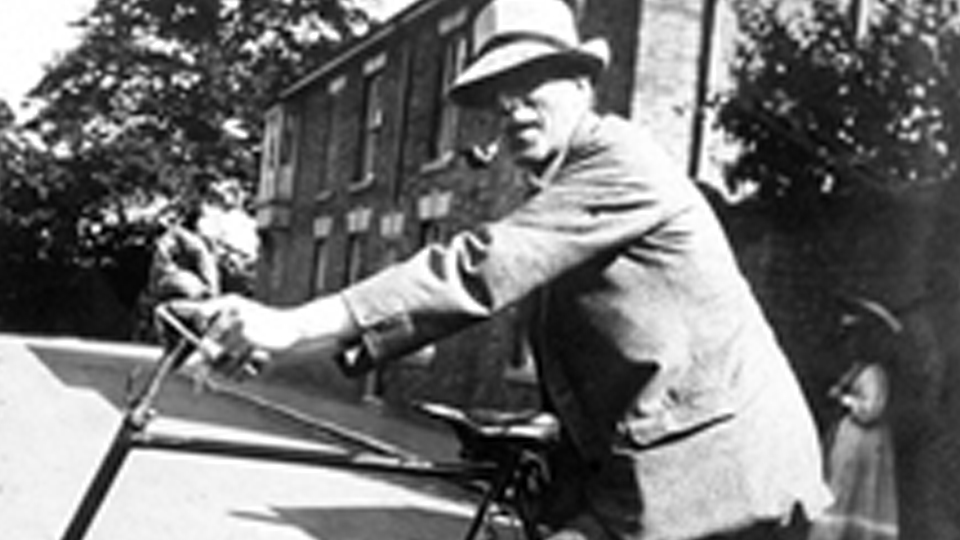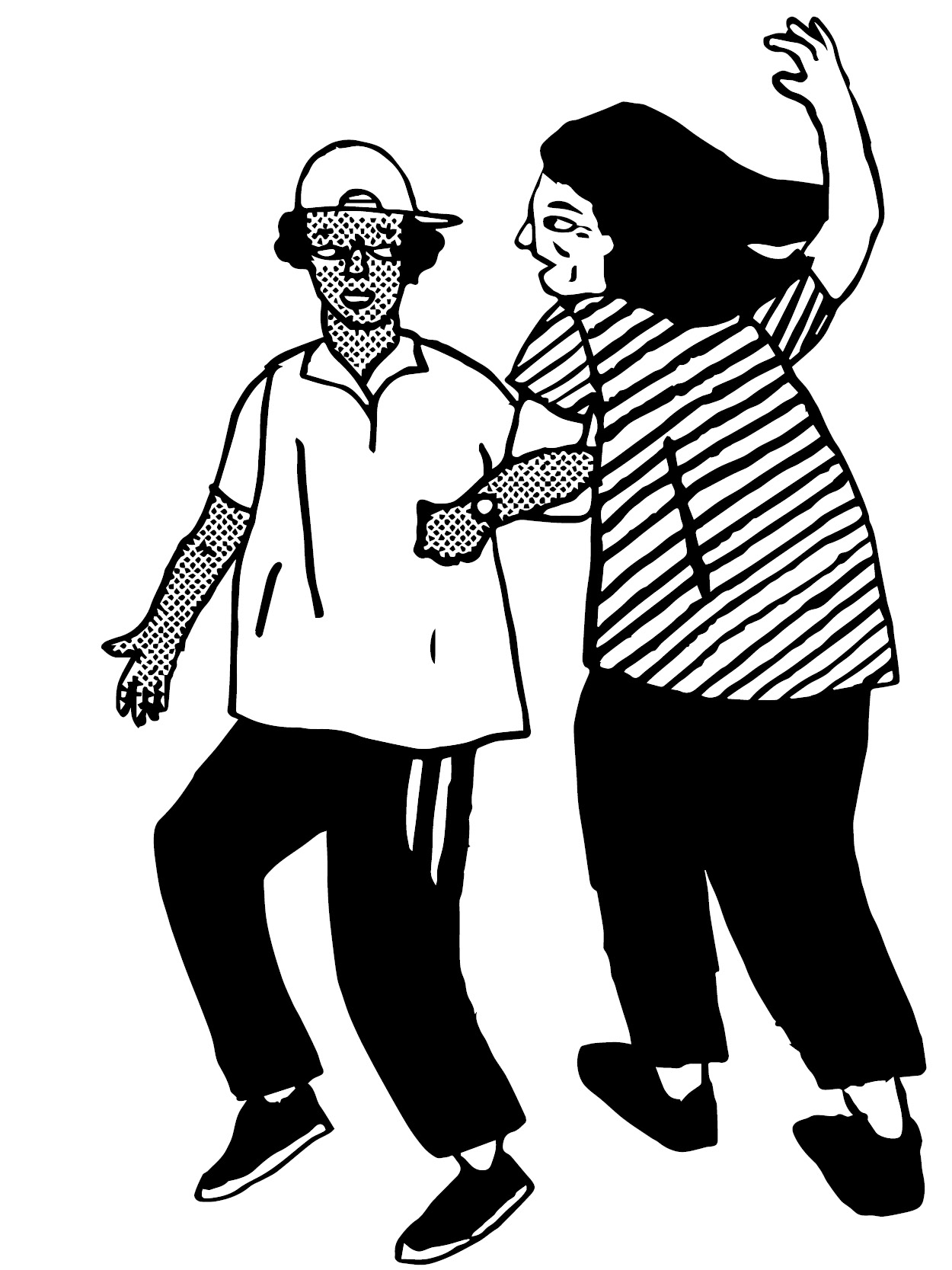Cecil Sharp
Cecil Sharp
(1859–1924)
Cecil James Sharp is the best-known collector of English folk music. Between his “discovery” of folk dance in 1899 and his death in 1924 he collected almost 5,000 folk songs and tunes, far more than any other English collector. His energetic schedule of lectures, demonstrations and newspaper articles, together with his leadership of the English Folk Dance Society from 1911, made him the figurehead of the folk movement.
He was born in Denmark Hill, South London, and attended Uppingham School before studying mathematics at Clare College, Cambridge (now the home of his fair copy manuscripts). Although mathematics was his primary subject, he did some courses in music and participated in musical activities throughout his time in education.
In October 1882, he left for Australia where he lived for nearly ten years, working as Associate to the Chief Justice of South Australia and then as a partner in the Adelaide College of Music. There he taught singing and music theory, in his spare time writing compositions of his own and conducting with the Adelaide Philharmonia Society. Incidentally, his comic opera ‘Sylvia, or, the Marquis and the Maid’ dating from this period features a morris dancing sequence, almost a decade before he came across the real thing.
Sharp returned to England in 1892 and in 1893 he married Constance Birch. In the same year he was engaged as a music teacher by Ludgrove School in North London. During his 17 years in the post, he took on a number of other musical jobs, most notably as Principal of the Hampstead Conservatoire of Music (1896-1905).
On Boxing Day 1899, Sharp was staying with his mother-in-law in Oxford and happened to see the Headington Quarry Morris Men performing a set of five dances. He was fascinated and called back their musician, concertina player William Kimber, to notate the tunes. In 1901 he joined the Folk-Song Society (formed in 1898) and a year later had published A Book of British Song, which included traditional and national songs. The move into collecting folk songs was a natural development, given his interests, although again it started with an apparently accidental event in 1903, hearing John England, gardener to his friend the Rev. Charles Marson, singing ‘Seeds of Love’ in Hambridge, Somerset. Sharp was not the first of the English folk song collectors, but like his predecessors (notably Lucy Broadwood, Sabine Baring Gould and Frank Kidson), he believed that traditional song
was dying out and needed to be recorded before it disappeared, with a particular emphasis on collecting the music.
Sharp’s involvement in the folk movement grew rapidly after this. He played a leading role in the effective relaunch of the Folk-Song Society in 1904 (it had become moribund following the illness and subsequent death of Kate Lee), and he became heavily involved in folk song publishing. He was a staunch promoter of folk song in the columns and letters page of the Morning Post, and with lectures and demonstrations across the country. All the while, he was having to fit his collecting into the school holidays. In 1907 his seminal ‘English Folk-Song: Some Conclusions’ was published, the only major theoretical work on English folk song published in the folk revival (other collectors packed their wisdom into book introductions or articles). His other big aim was to get folk song into the education system, an aim which was not shared by all of the collectors.
Sharp’s interest in folk dance was reawakened in 1904, when he was approached by Mary Neal and Herbert MacIlwaine of the Espérance Club, looking for folk dances for their girls to perform, This sparked renewed contact with William Kimber, the collection of dances and the development of dance notation (the music was the easy bit). The collaboration worked very well at first but then Sharp and Neal fell out – ostensibly Cecil Sharp felt that the dances were not being taught properly by trained teachers. The result was that Sharp emerged as the leader of the folk dance movement and he launched the English Folk Dance Society (EFDS) in 1911. Sharp and his helpers collected morris, sword and country dances, and published influential instructional books. He even drew historical Playford dances into the revival, arguing that they had been genuine dances of the English people.
The building up of EFDS and the encouragement of the use of folk dance in the education system took up much of his later career but there was one more major foray into song collecting, his Appalachian trips. Cecil Sharp did not go to America with the intention of collecting songs – he went in 1915 to advise on the use of folk dance in a Shakespeare production, to build up an EFDS network and to liaise with record companies – but he was alerted to the existence of English songs in the Appalachian mountains and provided with already-collected songs and advice by Olive Dame Campbell. Assisted by Maud Karpeles, he collected 1,500 songs and tunes in three expeditions between 1915 and 1918, an impressive achievement for someone dogged by ill health.
One of Cecil Sharp’s great achievements was helping to get folk music into the school curriculum. The role of music in education was a hot topic in the early 20 th century (see Gordon Cox’s ‘A history of music education, 1872-1928’). Cecil Sharp’s views were seen by some as radical and controversial, especially his views on teaching methods and the extreme focus on folk music. Sharp’s efficient networking and, later on, the training of dance teachers and the publishing of books of folk songs aimed at children all played a part in ensuring that many children first encountered folk music at school. From the 1950s, though, the use of folk music in school education went into decline.
Cecil Sharp died in 1924 and Cecil Sharp House, opened in 1930, was built in his honour. His manuscripts, notebooks, and artefacts reside in Clare College, University of Cambridge and the Vaughan Williams Memorial Library, London.
The controversies
While Cecil Sharp’s achievements were certainly recognised in his lifetime, he was not universally popular and some of his views did attract criticism. These ranged from technical arguments over the modality of folk song, to disagreements over the role of folk music in education. He was viewed with suspicion by many other figures in the folk world, due in part to his strongly voiced views and what might now be termed his prominent media profile.
However, as the folk revival faded his stature in the folk world seemed to grow, due in part to the efforts of his collaborator and disciple Maud Karpeles. She was his literary executor, had a hand in his biography and helped to get Sharp’s three principles of evolution of folk song (continuity, variation and selection) enshrined as the definition of folk music by the International Folk Music Council.
By the 1970s, the time was ripe for a reappraisal of Cecil Sharp’s work, but when it came, in the form of Dave Harker’s ‘Fakesong’ and Georgina Boyes’s ‘The Imagined Village’, it was savage and, in retrospect, not always well founded. The issues raised included the treatment of informants, middle class expropriation of working class culture, copyright, bowdlerisation, rural romanticism, selectivity in deciding what to collect and the relative importance of oral and printed sources of songs. Harker attacked the very concept of folk song, while Boyes examined the influence of anthropological theory on the collectors and the sidelining of women in the folk movement, although she perhaps exaggerated the influence of maverick figures such as Rolf Gardiner.
There followed a more measured critical appraisal of Cecil Sharp, which recognised the scale of his achievements, as well as his shortcomings. It also ushered in a period of detailed research into the folk revival and the history of songs that became folk songs.
More recently, attention has been focussed on Cecil Sharp’s racial attitudes, especially with regard to his collecting trips in the Appalachians. Sharp’s diaries contain racially offensive remarks and one of his acquaintances, in Sharp’s words: “resented my dubbing the negroes as of a lower race”. Cecil Sharp was not interested in Appalachian music as a whole: his mission in the Appalachians was to collect songs with a British origin (as things turned out, he did collect quite a few American songs and tunes). Having been told by Olive Dame Campbell that these songs resided almost exclusively with the white descendants of British immigrants to the USA, Sharp and Karpeles largely confined their song collecting to these populations. Sharp did collect a few songs of English origin from black people, and he describes the visit to Aunt Maria Tomes in his diaries and field notes: ‘Aunt Maria is an old coloured woman who was a slave belonging to Mrs Coleman... she sang very beautifully in a wonderfully musical way and with clear and perfect intonation... rather a nice old lady’.
There were two, sometimes interlinked, trends influencing many collectors of the day and the wider folk song community: a dislike of modern urban popular music and a cultural nationalism. In the context of the late 19 th century this involved a dislike of music hall and minstrel songs, and a belief that English folk tunes could influence English art music more generally and replace the perceived German influence. Of the collectors, Frank Kidson could see some virtue to the music hall song (it had a tune and words that ordinary people could identify with) and he made the observation that the class of people who used to sing folk songs were now singing music hall songs.
As the 20th century progressed and Cecil Sharp became more interested in dance, new “enemies” emerged. Music hall was superseded by jazz and jazz-based popular music, associated with the culture of black Americans. In his unpublished article on jazz, written for the Morning Post, Cecil Sharp made it clear that he didn’t like jazz or the associated dances. He said: “…it was heavily loaded with native African characteristics which however harmless or even admirable in the recreative gambollings of the American negro are scarcely desirable qualities in a white man’s dance”. The racism and unpleasant tone of his writing was shared by other writers on folk dance, such as Mary Neal and Violet Alford, and also found its way into the letters page of ‘English Dance and Song’ (prompting Patrick Shuldham-Shaw to send in a defence of jazz).
The idea that English music should be based on English folk music was hugely controversial in its time, although Ralph Vaughan Williams achieved great success in this manner (although he did have other influences). However, no-one could have foreseen how popular musicians, most notably the Beatles, could fashion an English voice out of predominantly American popular music, much of it of African American origin.
When it comes to the number of songs he collected, Cecil Sharp stands head and shoulders above any other English collector. He and others recorded songs and dances which otherwise may have been lost, providing a rich seedbank of material which has provided pleasure and artistic inspiration to thousands if not millions of people. We now recognise that he collected *an* English music, not *the* English music.
Cecil Sharp’s manuscripts, notebooks, and artefacts reside in Clare College, University of Cambridge and the Vaughan Williams Memorial Library, London. The principle period covered is 1903 to 1924 and the geographical coverage is of England as well as the Appalachian states of USA.
Browse Cecil Sharp's collection in the English Folk Dance and Song Society’s digital archive











